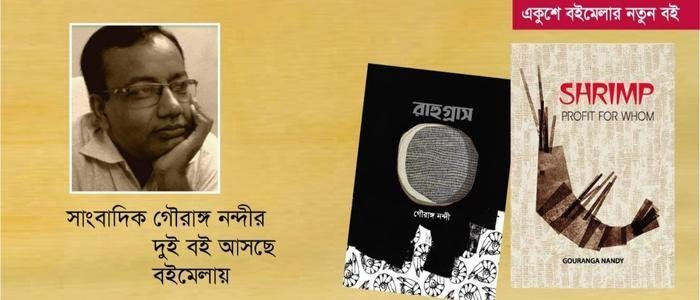Photo: Courtesy
Metropolis Report-
The two books—’Rahugrash’ and ‘Shrimp: Profit for Whom’—are going to hit the stalls of the next Amar Ekushey Book Fair 2023.
The first one, written in Bangla, is based on the agricultural people inhabiting Badaban next to the Sundarbans. A mixture of saltwater and freshwater forms the waters of the area. In the seventies of the last century (1961-1970), the freshwater environment was created by damming rivers in this region. Again in the 1990s (1981-90), outsiders forcibly cut the dam, introduced saltwater, and started shrimp farming. This brings misery to the lives of the farming families in the area.
At one point, the power of shrimp farmers decreased. By then, the dam gets far weaker. Due to the cyclone and flood, the dam broke down. Shivu, a member of a very ordinary family in a village near the dam, falls victim to the dominance of both humans and nature. Shivu is a simple, easygoing man defeated by society and nature. The story of his family life does not go normal either. Shivu’s wife leaves the house in search of safety. Another child of Shivu committed suicide due to grief. Rahugrash is the story of the life of a Shibu, wounded by the rage of both humans and nature.
The second one is written in English. Shrimp farming started on a commercial basis in the eighties of the last century in the southwestern part of Bangladesh. Under the government’s patronage, a class of rich urban people came forward in shrimp farming. It being very profitable, there is a lot of coercion here in the initial phase. In most cases, shrimp farming started by forcefully cutting the embankment without the land owners’ consent, without lease-deed, and without paying any compensation (rent). It creates unrest in this area, people are victims of disappearances and murders, and their habitats are destroyed; many were killed while opposing forced shrimp farming. A significant portion of the people in the area is now accustomed to a life centredaround shrimp farming. Now the income from shrimp is low, but the locals are forced to cultivate it as there is no other option.
Author’s Bio
Gouranga Nandy is a media professional, writer, and freelance researcher. He was born on April 2, 1963 in Khulna. He currently lives in Khulna. Much of his work is focused on environmental and development issues and the liberation war in 1971. He is the author of several books such as Liberation War based novel Rahugras (2023), Kapotakshoparer Kanya (2021) and Unoshottorer Raktobij (2018); Kaler Aina (Collection of essays) (2018), Bisher Jala (Field research on the impact of insecticides and pesticides) (2018), Manobpremy Acharya Profullya Chandra Roy (Biography of a great scientist Acharya Profulya Chandra Roy) (2017), Brihottor Khulnar Muktijuddher Itihash (History of Liberation War in greater Khulna) (2016), Deara Ganohotya (Genocide in Deara) (2015), Badamtala Ganohotya (Genocide in Badamtala) (2015), Upokule Nirapad Panir Aakal (Crisis in safe water in Coastal area) (2013), Jaler Fande (In the trap of the net) (2011), Chingri O Jano-arthoniti: Kar Laav Kar Khoti (Shrimp and public economy: Who gains, Who loses) (2007), Manobadhikar Andolon: Prekshit Dhakshin-Paschim Upokulio Plabonbhumi Anchal (Human rights movement in the southwestern part of Bangladesh) (2005).



